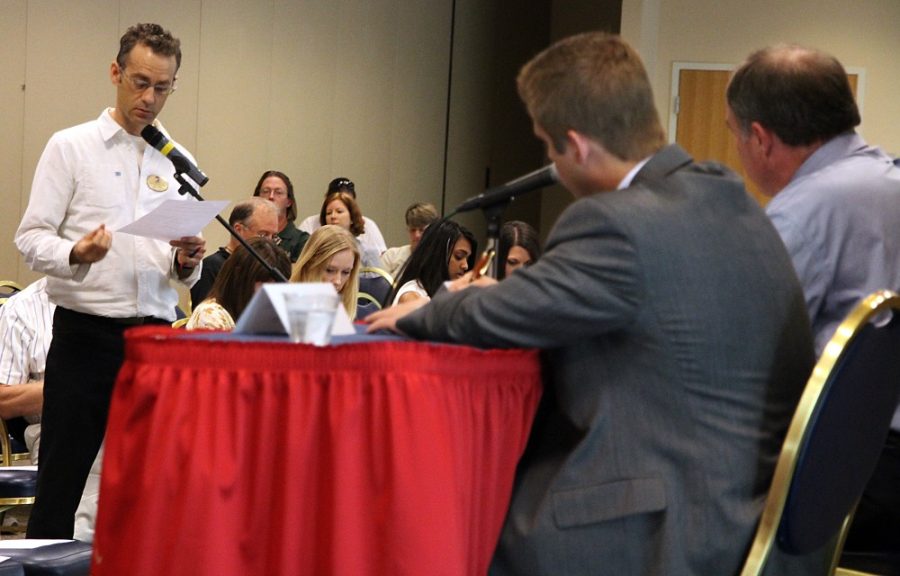UA community members vocalized attributes they want in a new president, including an understanding of research, budget issues, retention of quality faculty and the state university rivalry at town hall-style meetings on Thursday.
The Arizona Board of Regents Presidential Search Committee hosted the on-campus meetings, held in the Tucson and Catalina rooms in the Student Union Memorial Center as well as the Gallagher Theater. Attendees shared qualities they wish to see in the new UA president.
Regent Rick Myers, co-chair of the committee, said picking a new leader is “critical” to both the UA community and the state because the UA is a “catalyst” and “positive change agent” that makes a difference in the state, country and world. He said the forums, which are being held across the state, are important in order to get input from a variety of people.
“All of this together gives us a better understanding of what the university president will be faced with,” he said.
One of the main concerns Myers and participants had was the future president’s understanding of the UA as a Research I Institution.
Zachary Brooks, vice president of the Graduate and Professional Student Council and a graduate student studying second language acquisition and teaching and cognitive science, said research is one of the main components of graduate work and that the incoming president should have a background in research and academic experience. This background, he said, will allow the president to better relate to and understand the “major work” graduate students accomplish, which benefits the university.
Emphasizing the UA as a research institution, however, can allow a leader to become “out of touch” with other university and local community happenings, according to Suzanne Miles, the provost and executive vice chancellor for academic and student services at Pima Community College. Miles said that, though the UA needs to remain focused on research, the new president must also understand diversity and be student-centered.
“Don’t overemphasize the academy,” she told the regents. “There’s a fine line in what you need to look for.”
In addition, Miles said the incoming president must understand Arizona’s “budget issues,” especially if he or she is not from the state.
“You (the regents) should be upfront. It’s very difficult right now, but there is a way to get through all of this,” she added.
Myers said the potential candidates he has talked to said they are having budget problems in their states, and the current budget will not prevent candidates from coming to the UA.
“They (the candidates) are looking ahead,” he said. “They know it’s going to get better, and they want to be part of making it better.”
The other characteristics in the new president that attendees requested were efforts to retain strong faculty and to work with, not against, the administration of Arizona State University.
Brooks said the “churning” of professors drives down the UA’s quality on “lots of levels” because without the retention of quality professors, it will be hard to “build greatness.” Retaining faculty, he said, will also reduce the workload for graduate students because when faculty leave, the work they would normally do goes directly into the hands of graduate students.
Chad Travis, an Associated Students of the University of Arizona senator, said he thought it was important for a new president to understand the UA’s unique student culture. Student Regent William Holmes said that is a perspective that he and ASUA President James Allen will work to represent.
“We have a great bond on this campus,” Holmes said. “We all bleed red and blue. There’s no doubt about it.”
Ronald Wysocki, chair of the UA Appointed Professionals Advisory Council, said that though appointed professionals are not faculty, they have assumed the roles of traditional faculty over the last few years. He said that because of this, he would like the new president to ensure that appointed professionals can continue to teach in “maybe a three-year role” as opposed to their current year-to-year contract.
“They play large roles as being principal investigators in research grants and positions of leadership,” he said.
Wysocki added that the rivalry between the UA and ASU is “extremely intense on and off the field,” and that he hopes the new president will foster a “great relationship” with ASU’s president, Michael Crow. He said each state university has their own strengths, and that the strengths should benefit each other.
“We should be one entity to build things as opposed to blood rivals,” Wysocki said.
— Brenna Goth contributed reporting to this story.









